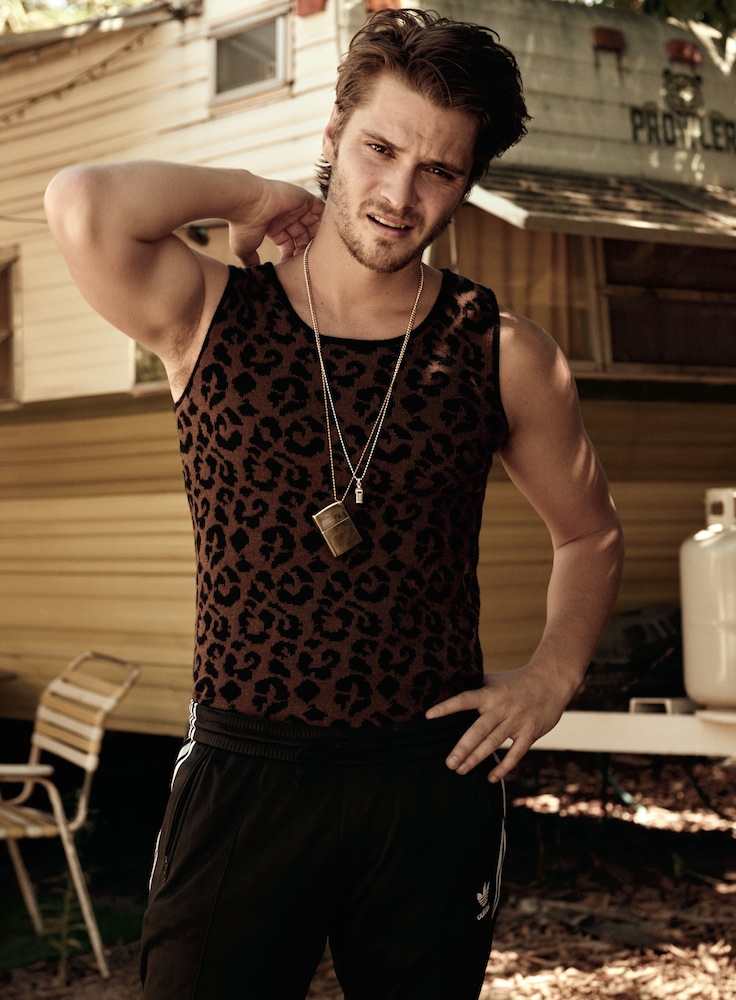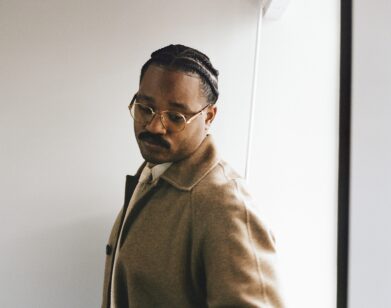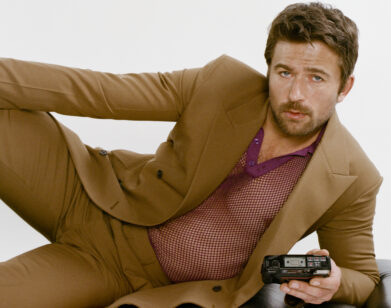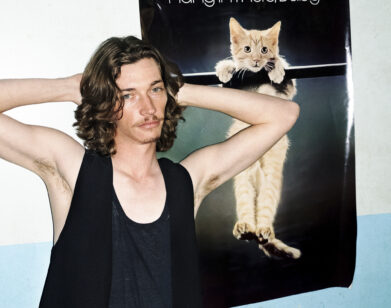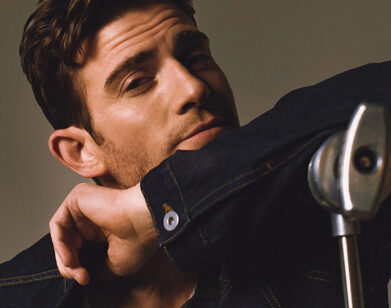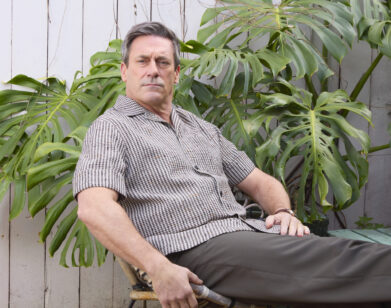Luke Grimes
Luke Grimes will tell you that acting can take you to some fun, wild, weird places. In just the last few years, his adventures in the screen trade have taken him from his native Ohio to the rugged deserts of Iraq (via Morocco and the hills around Northridge in the San Fernando Valley, during the filming of Clint Eastwood’s American Sniper), to the steamy wilds of Vancouver (for the ongoing series of Fifty Shades films), and to the occult outpost of Alan Ball’s dreamscape Louisiana, for HBO’s True Blood, just to name a few.
But if he has found performing to be a passport to the world, a reason to discover one’s love of horseback riding, and an introduction to some incredible artists (Liam Neeson, who helped Grimes quit smoking on 2012’s Taken 2, and more recently, Denzel Washington and Chris Pratt, his co-stars on The Magnificent Seven), the 32-year-old Grimes has also discovered that you have to be careful when you hitch a ride. As he explains to his pal (and Sniper star) Bradley Cooper, he fully embraces the power of turning down some of those adventures if they aren’t exactly right for him, the power of saying no. Shoots can be long, grueling, and, like any other job, as Grimes says, no one wants to work with a colleague who doesn’t want to be there.
And it’s this careful process of selection, along with his easiness with character and a willingness to learn from those around him, that has taken Grimes to a new, thrilling place—to the threshold of stardom.
BRADLEY COOPER: Thanks for getting up so early!
LUKE GRIMES: Sorry if my answers take a second. Now you know why.
COOPER: Are you at your home?
GRIMES: Yeah, man, I just bought a little bungalow out in Highland Park. I’ve been Airbnb’ing for years, and now I finally have a spot.
COOPER: Let’s give everybody the address.
GRIMES: [both laugh]. Open-door policy every day.
COOPER: I remember doing Wet Hot American Summer [2001], and Paul Rudd was on the cover of Interview magazine around then with, like, a fishbowl. And he was explaining to me, “Oh yeah, and then, like, your friend interviews you.” And I thought, “What?!” So I’m psyched to be a part of this. Um, dude, I didn’t know you were from Ohio.
GRIMES: Yeah! Dayton, Ohio. You’re from Pennsylvania, right?
COOPER: Yeah, I’m from Philly. So did the [Republican National] Convention affect you at all?
GRIMES: Not really. That doesn’t seem like Ohio to me. I’m so southern Ohio. And Cleveland is a different world, you know?
COOPER: I’ve only been to Chagrin Falls, Ohio. I think the first Burning Man was from Chagrin Falls. I could be making that up.
GRIMES: That sounds awesome and weird.
COOPER: I also learned that your father is a Pentecostal pastor. I did not know that.
GRIMES: Yeah, that was kind of a big deal growing up.
COOPER: I was thinking about the scene we did on the truck before we get shot in [American] Sniper, when you’re praying.
GRIMES: Right. And then we have that scene where we’re talking about—
COOPER: Lightning.
GRIMES: And the gods and all that. My dad was pretty psyched about all that stuff.
COOPER: When you took on that role, did you sort of let that bleed into what you were doing? Was it a conscious choice to utilize that?
GRIMES: Well, growing up the way I did and having a dad who’s a pastor, it’s just in you. And moving away, going to New York and then L.A., and doing what I do, you’re trying your best to filter some of it out. No matter what I do in my life, though, it’s there—especially if I have to play it into a role. It’s so accessible. I know it so well because I bought it hook, line, and sinker from the time I was born until sometime in my twenties when I’d traveled enough and been around the world enough and learned about other cultures enough to let some of it go. But it’s still very present. I actually brought my dad the day that we did that scene about God and lightning and all that. And something about having him there, watching the monitor while I did that scene …
COOPER: Wow. Did I meet him that day?
GRIMES: You did. You made his decade, dude. He was so psyched to be there. And Clint [Eastwood] touched his belly; it was very cute. [both laugh] I mean, the fact that I played that part in that movie and said those things was special to him.
COOPER: Wow. [pause] Denzel Washington—tell me about him.
GRIMES: Have you met him?
COOPER: Oh, yeah. He’s like a hero to me. Last time I saw him, I was doing The Elephant Man, and he came, and I hung out with him after. I think he’s one of the greatest.
GRIMES: Yeah. He’s dedicated, man. A very committed guy. To the point where I don’t feel like I really got to know him that well—even though we spent five and a half months together doing our film—because the guy works so hard.
COOPER: And you were part of his team?
GRIMES: This town gets overrun by bandits. And me and this girl from the town go to find these guys to help us fight the bandits. Denzel and I spent a lot of time together. But the nature of my character is that he’s kind of an observer, so he doesn’t really interact with anyone more than he needs to. He’s just learning and watching. And his biggest objective is to keep the woman that he’s with safe. But I definitely learned a ton watching the way he does his thing. While everyone else was socializing and getting into the experience that way, I noticed that, a lot of times, he was sitting off to the side, really thinking about how to make the best movie we can make. He worked his ass off.
COOPER: I remember somebody describing him as “Where some people’s heartbeat speeds up after action, Denzel Washington’s slows down.” I always remember that.
GRIMES: Yes, that makes sense. That’s really cool.
COOPER: You’re going to open the Toronto Film Festival. That’s pretty exciting. Have you been to that festival before?
GRIMES: I have. The first film I ever did was called All the Boys Love Mandy Lane [2006]; it was directed by Jonathan Levine. He’s done pretty well since then. He did Warm Bodies [2013] and 50/50 [2011], and some pretty good films. We went in 2006. I had a great time.
COOPER: Yeah, I’ve not been to many festivals. I went to Sundance with Wet Hot American Summer, back in 2001. We all—like, 15 of us—stayed in one little space. I shared a bunk with Amy Poehler. [laughs] And then we took Silver Linings Playbook to Toronto. I loved that festival. I thought it was incredible. Some of those theaters, man. There’s one theater, which may be where The Magnificent Seven will play, that’s, like, 2,000 seats. It’s just incredible.
GRIMES: Speaking of Wet Hot American Summer—the documentary on the making of that was awesome.
COOPER: Yeah, it’s pretty embarrassing. [both laugh]
GRIMES: Was that your first movie?
COOPER: Yeah, man! I was still in grad school. I had to miss graduation.
GRIMES: Straight out of acting school.
COOPER: [laughs] Oh my God. You think, like, “Wow, I feel like I look exactly like I did when I was younger. I don’t see how all my friends are getting older.” But then I look at that and I’m like, “Jesus, I look like a child compared to the way I look now.” But, yeah, that’s pretty crazy. How was Chris Pratt to work with? I love that guy.
GRIMES: He’s the best, man. He’s just as lovable and kind and funny and awesome in person as he is in the characters he plays. I had such a good time being around him. He makes everyone have a better time all the time. And to do that and to have the weight on his shoulders of where he’s at right now, it’s special. I hope to learn some things from that if I ever get to that level. How to maintain that sense of fun, actually enjoying what you’re doing, you know?
COOPER: Do you enjoy what you’re doing?
GRIMES: I do. When I’m doing it. I’m at an interesting in-between stage right now, waiting for the work that I know is actually going to be inspiring and teach me some things and not just working to work.
COOPER: How old are you now?
GRIMES: 32.
COOPER: Yeah, 32. And you don’t take anything that you really don’t believe in, which I really admire, and maybe people don’t know that.
GRIMES: I was really lucky. My first ever —I’d never worked before—told me, “You can pass on anything you want.” I didn’t know anything about the business, so that seemed kind of surprising to me. But the more I started doing it, the more I realized that these are big experiences and you go off for long periods of time. And if you’re doing things that you don’t want to be doing or you’re working with people who aren’t making you better and you’re not learning, if things aren’t challenging you, you could be wasting your time. You might be making some money, but you might not be improving as an actor. So I’m really glad he allowed me to do that. And I’ve done it ever since. I’ve made a few decisions along the way where I’m like, “Oh, maybe I could’ve gone without that one,” or whatever, but for the most part, anything that I do is something that I’m passionate about and really believe in, no matter how it turns out. It’s about the experience that you get, loving it.
COOPER: Yeah, these are intense experiences, and it does take a lot of dedication and time. And if it’s not worthwhile, you realize it’s a mistake.
GRIMES: I don’t want to be that guy on some set he doesn’t want to be on. It just bums everybody out.
COOPER: Did you grow up by any horses, or is that something you had to learn for the movie?
GRIMES: I did not. I didn’t do any real riding until the film. And it was cool because they let us go as often as we wanted up to this ranch not too far from L.A. and ride-open-door policy with the wranglers. So I was riding three times a week for about six weeks leading up to the film.
COOPER: Were you riding male horses or female horses?
GRIMES: [laughs] I was riding male horses. Why? Is there a big difference between the two?
COOPER: I just remember when I did Serena [2015] that you can’t ride a stallion.
GRIMES: Oh, right. One that’s not fixed.
COOPER: Yeah, exactly.
GRIMES: I think once they’re fixed, they’re pretty similar. Mine seemed a little lazy. But it gave me a newfound passion for riding.
COOPER: I felt the same way, man. I completely fell in love with riding horses. I really didn’t want to wear a helmet when I would go off with the trainer on weekends, galloping through forests and stuff. But thank God he made me, because one time, I was going under a tree and my helmet hit a branch. It literally would have taken my head off.
GRIMES: Wow.
COOPER: It’s like riding motorcycles; it’s a similar feeling, I found.
GRIMES: I didn’t know you were a motorcycle guy! Like a cruiser or a sport bike kind of guy?
COOPER: I’ve never ridden a hog. I only have sport bikes. But that’s basically how I get around L.A. Because traffic is horrendous.
GRIMES: And that must be good for the anonymity too. With the helmet on.
COOPER: That’s true. You know what I want to talk about? Sam Taylor-Johnson, who I love and who you worked with on Fifty Shades of Grey.
GRIMES: Yeah, she’s the best. So super cool. Like, what a neat being, ageless and cool and ethereal.
COOPER: I’d like to work with her. I love her husband, too. Aaron [Taylor-Johnson] is incredible.
GRIMES: Yeah, man. They have a really special thing going on.
COOPER: He was doing a movie where he’s playing a soldier, and I put him in touch with Jacob Schick—do you remember, he was the Marine Corps sniper in Sniper who is shooting toward the end of the movie, and who really was injured in Iraq?
GRIMES: I do.
COOPER: He’s a great guy. I’m actually going to see him Friday. We’re going to go to Bethesda to visit with some vets at Walter Reed. But he’s really helped out Aaron.
GRIMES: Yeah, he’s a cool cat.
COOPER: I didn’t know you worked with Liam Neeson, who I did The A-Team [2010] with. I love that guy.
GRIMES: Yeah, I only had, like, two days with him on Taken 2. [In the film] he was giving me the stink eye for his daughter being at my house. It was one of those scenes, you know? “What are you doing with my daughter?!” He’s very intimidating. But offscreen, he’s such a nice, lovely guy. The gentle giant. Plus, he helped me quit smoking. He was walking around with a toothpick in his mouth one day and I was like, “Did you quit?” And he told me about this book to read, which helped me quit smoking. So, thanks, Liam Neeson.
COOPER: [laughs] What are you doing next?
GRIMES: I’m not sure right now, man. A couple things are kind of circling.
COOPER: Do you still audition for stuff?
GRIMES: Yeah, for sure. I mean, the things that I really want, a lot of people really want, and I’m not at any level at this point to be able to just pick and choose so … and I like reading for things. I’ve shown up for jobs before where I haven’t read for them, and there’s something kind of intimidating about that—where the first words they’ll hear from me are when they call “action.” There’s something about actually going in and earning a part and going, like, “Okay, they really liked what I did, and so I’m on the right track.”
COOPER: That’s so true, man. I remember the first scene we shot in Sniper was me and you, dude, when we’re talking about wanting to get backing so we could go to that guy’s house, and Clint goes, “Oh, that’s how you’re going to do it? Talk like that?” Like he never even heard [me performing as] Chris before. [laughs] I remember thinking, like, “Oh yeah, I didn’t even go over with him who this guy is.”
GRIMES: [laughs] That’s awesome.
COOPER: And then he spent the rest of the movie making fun of how I was talking. [both laugh] We would go to dinner and he would order … And it was just easier for me to stay in that voice the whole time, so when I would order, he would mimic how I was ordering it. It was pretty funny. He was the best, dude, right? I mean, Jesus.
GRIMES: I mean, obviously. Everyone knows he’s the king of cool. But also, like, really engaging and one-on-one tender. There’s something special about that dude. I’ve got to say, man, I don’t know if I ever got the chance to tell you, but you were fucking amazing in Sniper. You really blew me away.
COOPER: Oh, thanks, man.
GRIMES: That’s the thing when you’re acting with someone in something, and then when you finally get to see it onscreen, you’re like, “Wow!” Like, you really knew what you were doing, man. You’ve definitely got some amazing film acting technique going on, because it was all right on the money.
COOPER: Well, cool! I just loved that experience, and I loved our scenes. Have you ever done theater?
GRIMES: I’ve never done theater professionally. But I went to the American Academy of Dramatic Arts, so I did some theater there. We didn’t do any long runs. We would only put a show on, like, two or three times.
COOPER: Is that something that you’d want to do at some point?
GRIMES: Absolutely! Without a doubt. My agent’s looking out for stuff all the time that I’d be able to do. I think that’s a real proving ground, that’s when you’re a crime fighter or something as an actor, I feel like. You’ve done it, obviously, so you would know more than me. There must be nights when you aren’t feeling it, and just finding that technique and finding that thing within you to keep making that show good for the people that paid to show up, there’s something about that that I respect a lot. What was your experience like with that?
COOPER: Based on what you said about going to work when you’re doing something you don’t want to do, if that’s a play, you’re done. [laughs] Because you do have to do eight shows a week. It’s such a reminder how important material—the story you’re telling and the people you’re telling the story with—is. When all those things are firing in a positive way, it’s probably the most fulfilling experience, artistically, I think that you can have. I had that on The Elephant Man. We did 208 performances in less than a year. And I loved every single night. I really did. The audience is right there, and they’re a character with you. And that’s why it’s different every night. Actors will often say, “Oh man, it’s just boring. I could never do that. You’re just redoing it.” But that’s not my experience. Every performance is completely its own thing. And it grows, becomes this whole other beast. But I always thought that you would be amazing onstage. That’s why I asked.
GRIMES: Oh, thanks, man.
COOPER: Have you talked to Jake [McDorman] lately?
GRIMES: Yeah, he was just over at my house on Friday night.
COOPER: Oh, no shit. How’s he doing?
GRIMES: He’s great. We try to hang out as much as we can when we’re in the same city. I’m really lucky to have had that Sniper experience with him, and we’ve been really good friends ever since.
COOPER: That’s awesome. That’s the best thing. I’ve definitely been lucky. Keir O’Donnell was the guy I did Wedding Crashers [2005] with, and he wound up playing Chris’s brother in Sniper. We stayed close all those years. I love Jake, man. Last time I saw him I was out here in New York.
GRIMES: Yeah, he’s been back for a bit now so we’ve been hanging.
COOPER: How do you spend your downtime in between gigs? Is there a routine? Are you somebody who likes ritual? Do you need to be around people? Or do you like just sort of chilling out?
GRIMES: At this stage of the game—and you have a lot of stages as an actor—I think it’s important how you spend your time. I try to make sure that I’m growing. Obviously, in my twenties, a lot of downtime was spent having a good time, which I don’t regret; that was what I needed to do to get some things out of my system. But now my job has me traveling all the time, and I got this house, so my downtime is spent sort of making a home. Every year it’s different, and I try to do things that are more fulfilling. And, not to sound cliché or anything, but with the downtime that I have and the possible platform that my work could give me, I’d like to figure out a way to give back and make a difference, you know? But right now, this moment, I’m working on my house and playing with my fire pit and kind of just hanging around and making my home feel homey.
BRADLEY COOPER IS A THREE-TIME ACADEMY AWARD-NOMINATED ACTOR. HE WAS MOST RECENTLY SEEN IN THE FILM WAR DOGS.

